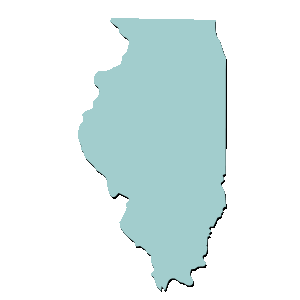Illinois Retirement

Illinois may not be a very good place to retire because of rising taxes. In January the state legislature approved a 66% increase in the personal income tax. That means the income tax will rise from 3% to 5% for the average individual. News reports indicate that this was the biggest tax increase in any state in recent memory.
The tax increase was implemented to cover a massive budget shortfall in Illinois. The states budget woes are continuing despite the tax increase so retired individuals who live in Illinois can expect increased taxes and fewer government services.
The only advantage to Illinois' tax system is that it is based on flat rates. This means that tax rates are fairly easy to determine in Illinois. It also means that almost everybody is subject to income tax in the Land of Lincoln.
» Speak to a Illinois Retirement Advisor for Free
Illinois Income Tax
Illinois charges a flat income tax rate of 5% that applies to all individuals. This means that most residents of Illinois will have to pay the state income tax. The effective tax rate is 5% of a resident's current net income. This is determined by adding the adjusted gross income from a federal tax return and any additional income.
Most retirement income in Illinois is not subject to the state income tax. This includes IRAs, 401ks, the federally taxed portion of Social Security and almost all pensions. Benefits and pay for retired veterans are not taxed in Illinois.
There is a $2,000 individual exemption in Illinois and an additional $1,000 exemption for individuals over 65. That means there is effectively a $3,000 income tax exemption for everybody who is over 65 in Illinois.
Any person who lives in Illinois and makes more than $500 a year will have to file an income tax return, even if they do not have to pay the income tax. This means that almost all retired persons will have to file an Illinois Income tax return.
There is also a flat 3% capital gains tax in Illinois. That means all gains income from investment would be subject to a 3% tax. The capital gains tax would not cover investments made through retirement accounts.
Property Taxes in Illinois
Property taxes in Illinois are set by the county government and based on the assessed value of a property. Since property tax rates vary, individuals will have to check with the County Assessor to determine the rate in their area.
Illinois makes fairly large property tax breaks called Homestead Exemptions available to homeowners. The most common of these mechanisms, the General Homestead Exemption, provides a $6,000 reduction in property tax on homes inhabited by homeowners.
There is also an Alternative Homestead Exemption for Cook County (Chicago), the alternative exemption provides a reprieve of up to 7% of the property value. It also limits the maximum exemption to $20,000.
Persons over 65 years of age can also take advantage of the Homestead Property Tax exemption on their homes. To qualify for this a person or couple must earn less than $50,000 a year.
Another tax that Illinois residents should be aware of is the Real Estate Transfer Tax, a sales tax on real estate that must be collected when property is bought or sold in the state. The rate of this tax varies as determined by local governments.
Illinois Sales Tax
Illinois has a Sales Tax on what it calls general merchandise. General merchandise excludes groceries, prescription drugs, nonprescription drugs, and medical devices. Vehicles are covered by a separate tax.
The sales tax rate in Illinois varies widely depending on location because there are many local government sales taxes that can be added to the state tax. The Illinois Tax Rate Findercan help you determine the sales tax is in your area.

| Capital: | Springfield |
| Cost of Living Rank: | #20 |
| Sales Tax: | 6.25% |
| Income Tax: | 5.0% |
| State Website: | http://www.illinois.gov |